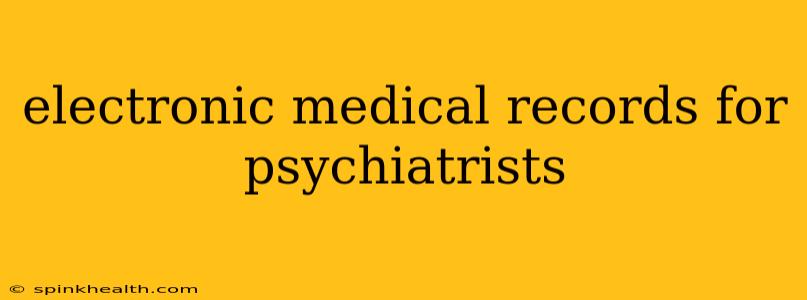The world of psychiatry is transforming, moving away from paper charts and into the digital age. Electronic Medical Records (EMR) are no longer a luxury but a necessity for psychiatrists, offering improved efficiency, better patient care, and streamlined workflows. But choosing and implementing the right EMR system can feel overwhelming. This comprehensive guide will navigate you through the key considerations and benefits, answering many of the common questions psychiatrists have about this crucial technological shift.
What are the benefits of using EMR software for psychiatrists?
Imagine a world where scheduling appointments, accessing patient history, generating reports, and managing billing are all simplified, with less paperwork and more time dedicated to patient care. That's the promise of a well-integrated EMR system. The benefits extend far beyond convenience, though. A robust EMR can significantly enhance the quality of care provided. For psychiatrists specifically, this translates to better monitoring of patient progress, reduced medication errors, and improved collaboration with other healthcare providers. Think of it as having a powerful, organized assistant dedicated solely to streamlining your practice. Instead of wrestling with filing cabinets and stacks of papers, you can focus on what truly matters: your patients.
What features should I look for in an EMR for my psychiatric practice?
Choosing the right EMR isn't about picking the flashiest option; it's about finding the perfect fit for your specific needs and practice style. Key features to prioritize include robust patient charting functionalities that allow for detailed documentation of symptoms, diagnoses, and treatment plans, especially concerning mental health specifics. Secure messaging and telehealth capabilities are increasingly vital, allowing for remote patient monitoring and communication. Integration with pharmacy systems for streamlined prescription management is crucial to reduce errors and improve patient adherence. And finally, robust reporting and analytics tools offer valuable insights into your practice's performance and your patient population, helping you refine treatment strategies and identify areas for improvement. Don't forget about ease of use – a system that's difficult to navigate will ultimately hinder your workflow.
How much does psychiatric EMR software cost?
The cost of psychiatric EMR software varies significantly depending on several factors. These include the size of your practice, the features you require, and the chosen vendor. Some systems offer subscription-based pricing models, while others charge upfront fees. It's essential to carefully compare pricing structures, factoring in any additional costs such as implementation, training, and ongoing support. Many vendors offer different tiered packages with varying features and price points to accommodate different practice sizes and needs. Thorough research and comparing quotes from multiple vendors are vital steps in making an informed decision.
What are the security and privacy concerns related to using EMRs in psychiatry?
Patient confidentiality is paramount in psychiatry. Therefore, selecting an EMR system that adheres to rigorous security and privacy standards – like HIPAA compliance in the US – is non-negotiable. Look for systems that offer robust encryption, access controls, and audit trails to ensure the protection of sensitive patient data. Understanding the vendor's security protocols and their commitment to data privacy is crucial. Don't hesitate to ask detailed questions about their security measures and compliance certifications.
How can I choose the best EMR system for my psychiatric practice?
The best EMR system isn't a one-size-fits-all solution. Begin by identifying your specific needs and prioritizing the features crucial to your practice's workflow. Consider the size of your practice, the number of patients, and the specific functionalities you require. Request demos from several vendors to evaluate their user-friendliness and functionality firsthand. Read reviews from other psychiatrists to gauge their experiences and identify any potential drawbacks. Finally, don't hesitate to ask questions – a responsive and helpful support team is invaluable. Remember, this is a significant investment, so taking your time to thoroughly research and evaluate options is well worth the effort.
What is the process of implementing a new EMR system in a psychiatric practice?
Implementing a new EMR is a multifaceted process requiring careful planning and execution. It typically involves several phases, starting with the selection of the system, followed by data migration from your existing system (if any), staff training, and a phased rollout to minimize disruption. Throughout this process, ongoing support from the vendor is vital. Expect some initial challenges as staff adapt to the new system, but with proper training and a well-structured implementation plan, the transition should be relatively smooth.
The shift to EMRs represents a significant advancement for psychiatry, improving efficiency, patient care, and overall practice management. By carefully considering these factors and taking a proactive approach to implementation, psychiatrists can harness the power of EMRs to enhance their practices and provide the best possible care to their patients.

